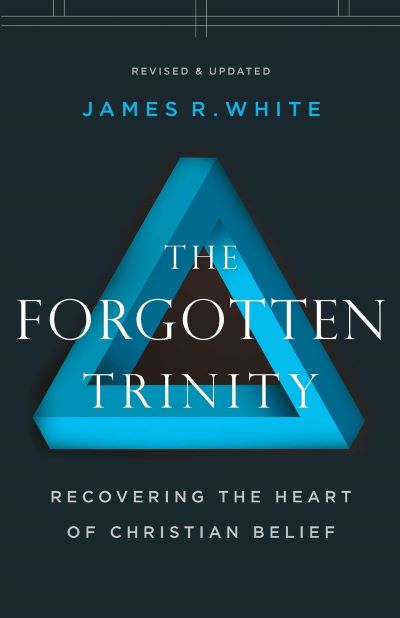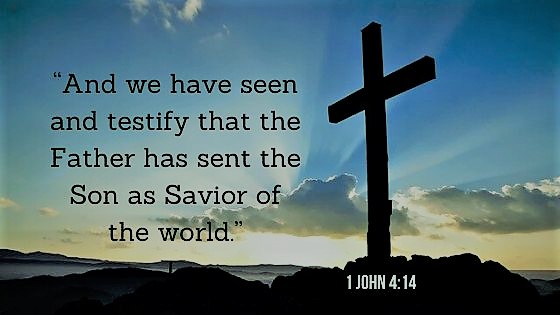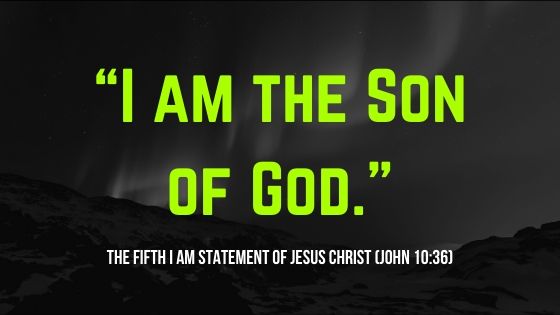To be a Christian means you do not only believe that Jesus Christ is the Son of the living God but that He is also God. Unfortunately, many people today who claim to be Christians believe that Jesus is nothing but human. They say Jesus was one of the prophets, or that He was a great rabbi (teacher) or a messenger from God.
Is Jesus God or the Son of God? What does the Scripture say?
The Jews Reject Jesus
In John 10:22-42, we read how the Jews rejected Jesus. During the feast of Jerusalem in wintertime, the Jews surrounded Jesus as He walked in the temple, in Solomon’s porch, and said to Him, “How long do You keep us in doubt? If You are the Christ, tell us plainly” (John 10:24)
In reply, Jesus said, “I told you, and you do not believe. The works that I do in My Father’s name, they bear witness of Me. But you do not believe, because you are not of My sheep, as I said to you. My sheep hear My voice, and I know them, and they follow Me. And I give them eternal life, and they shall never perish; neither shall anyone snatch them out of My hand” (John 10:25-28).
Jesus could have stopped right there because He knew that no matter what He will say, they would not believe Him anyway. But He went on to say something that provoked the Jews to anger and they took up stones to stone Him. Why were the religious leaders so upset with Jesus that they wanted to kill Him? It’s because of what He said.
What did Jesus say? He said, “My Father, who has given them to Me, is greater than all; and no one is able to snatch them out of My Father’s hand. I and My Father are one” (John 10:29-30).

Jesus has been teaching them about the kingdom of God and performing many miracles that caused division among the Jewish people. While some said Jesus was demon-possessed, others argued that the words He has been speaking could not be from someone who has a demon and that a demon can’t perform miracles.
Jesus Claims to be God
One of the most common arguments from people who do not believe that Jesus is God is Jesus’ claim that He is the Son of God. They say, “Jesus said that he is the son of God but he never said, “I am God worship me.”
What they are saying is that Jesus is the son of God in the same way that we are the sons of God. Okay! But if this is what Jesus meant, there would be no reason for the religious teachers to get so angry that they wanted Him dead, right?
Clearly, Jesus said something that a modern Bible reader might not fully grasp without considering the fact that Jesus was speaking to a Jewish audience. The fact that the religious leaders charged Jesus with blasphemy for saying that He and the Father are one proves that Jesus spoke of much more than a purpose and will.
Note: The statement of Jesus in John 10:30 holds great importance regarding His deity and the nature of the Godhead. “I and My Father” means that the Father and the Son are not the same Person, refuting the doctrine of “Modalism” or “Sabellianism.” And the words “are one” means that the Father and the Son are equal in nature.
The Jews of Jesus’ day clearly understood what the Jehovah’s Witnesses and other Oneness denominations today seem to miss – that Jesus clearly claimed to be God. And for a mere man to claim equality with God is blasphemy.
The Law of Moses laid down the penalty for such a crime: “And whoever blasphemes the name of the Lord shall surely be put to death. All the congregation shall certainly stone him, the stranger as well as him who is born in the land. When he blasphemes the name of the Lord, he shall be put to death” (Leviticus 24:16).
Recommended Resource: The Forgotten Trinity by Dr. James R. White
 While many of us struggle to understand it, the Trinity is one of the most important teachings of the Christian faith. It defines God’s very essence and describes how He relates to us. And while it can be a difficult concept to get our heads around, it is crucial for believers to understand how God explains His triune nature in His Word.
While many of us struggle to understand it, the Trinity is one of the most important teachings of the Christian faith. It defines God’s very essence and describes how He relates to us. And while it can be a difficult concept to get our heads around, it is crucial for believers to understand how God explains His triune nature in His Word.
In this book, James R. White offers a concise, understandable explanation of what the Trinity is and why it matters. While refuting the distortions of God presented by various cults, Dr. White shows how understanding this teaching leads to renewed worship and a deeper understanding of what it means to be a Christian.
And amid today’s emphasis on the renewing work of the Holy Spirit, The Forgotten Trinity is a balanced look at all three Persons of the Trinity.
May this book deepen your understanding of this important doctrine while also drawing you closer to the triune God Himself.
Jesus Defends His Claims to be God
When the Jews accused Jesus of making Himself equal with God, instead of denying their accusation He went into great lengths to affirm the charges and proceeds to defend His claims to be God.
In John 10:34-36, Jesus answered them, “Is it not written in your law, ‘I said, ‘You are gods?’” (which is a direct quote from Psalm 82:6). If He called them gods, to whom the word of God came (and the Scripture cannot be broken), do you say of Him whom the Father sanctified and sent into the world, “You are blaspheming,” because I said, “I am the Son of God?”
This is a rabbinic form of argument that some misunderstand. They claim that Jesus was toning down His claim to deity by showing that the term “gods” can legitimately be used of men in certain ways. Thus, He, a man may be called “the Son of God.” But if this is what Jesus was doing (toning down His claim to deity) the Jews would not have tried to seize Him.
Jesus Backs His Claim with Works
To back His Words, Jesus repeatedly appealed to His works (John 10:25).
When the Jews picked up stones to hurl at Him after His claim to be one with the Father, Jesus said, “Many good works I have shown you from My Father. For which of those works do you stone Me” (John 10:32). Then He adds, “If I do not do the works of My Father, do not believe Me; but if I do, though you do not believe Me, believe the works, that you may know and believe that the Father is in Me, and I in Him” (John 10:37-38)?
In each case, Jesus pointed out that His works backed up His verbal claim. As we can see, all that Jesus said and did, especially His miracles confirm that He is God and the son of the Living God.
But despite all this evidence, some still chose to reject Jesus. We would have thought that Jesus would be welcomed in Jerusalem as Messiah because the people there had more than sufficient reasons to believe in Jesus; He was not only rejected but also the people were intent on murdering Him.
Note: You can read the arguments people have against the deity of Christ here.
The Father Sent His Son
Jesus made two other claims: He was consecrated by the Father for a special task and He was sent into the world to carry out His Father’s mission (John 10:36). The scriptural understanding of sanctification is to make holy for God – to be given over as free-will offering and sacrifice for God.
Jesus made Himself a sin-offering for us, to ransom us from condemnation and slavery to sin. He spoke of His Father sanctifying Him for this mission of salvation. Jesus challenged His opponents to accept His works if they could not accept His words. One can argue with words, but deeds are beyond argument.

Did Jesus claim to be God or the Son of God? Yes, He did by His words backed with works. Jesus is not only the Son of the living God; He Himself is God.
Jesus is also the perfect teacher in that He does not base His claims on what He says but on what He does. The Word of God is life and power for those who believe and accept it as God’s word for us.
Jesus shows us the way to walk the path of truth and holiness. And He anoints us with His power to live the Gospel with joy and to be His witnesses in the world.
Are you a doer of God’s word, or a forgetful hearer only?


Dear Alice
First of all, I would like to thank you and give glory to our heavenly Father for keeping us alive up to this very moment despite who or what we are in His sight.
In response to what you have explained to me, I have just 4 words for you: “Thank You Very Much.”
Best regards and remain blessed.
You are very much welcome, David. I’m just glad I was able able to help. Please do come by from time to time as we regularly publish articles that you may want to read.
And should you have other questions you want us to address, please don’t hesitate to ask. You can always leave your question or comment on any post here and we’ll try our best to answer them.
Blessings!
Dear Alice,
Please, kindly explain to me and others what Matthew 23:9 really means. I am very sure that many Christians don’t understand it and so is me.
Best regards,
Dr. David Okullo
Republic of Botswana
Hi David,
How are you? It’s been a while that I have not heard from you. I hope you are doing great.
While your question on Matthew 23:9 is far from the article about Jesus’ claim as the Son of God and as God, I will be glad to answer it. I’m not sure if you are aware but this verse is often used by Protestants when refuting Roman Catholics for addressing their church leaders “Father.” What did Jesus mean when He told the Scribes and Pharisees not to call anyone on earth Father?
In order for us to correctly interpret and apply Matthew 23:9, we need to read the entire passage and see what it’s all about. So if we read from the New King James Version, which is what I use on this website (unless I say otherwise), the heading reads: “Jesus Denounces the Scribes and Pharisees.” So from the get-go, we see that Jesus was warning His audience about the hypocrisy of the Scribes and Pharisees, who are a group of religious leaders (Matthew 23:1-7).
Please take note of Matthew 23:7 where Jesus tells His audience how the Scribes and Pharisees love to be called “Rabbi, Rabbi” by men. Jesus then goes on to warn the people and His disciples to not let others call them “Rabbi,” (which means teacher). Why? Because there is only One Teacher, i.e. Christ, and that they are all brethren (Matthew 23:8).
Continuing on to the next verses, Jesus says, “Do not call anyone on earth your father; for One is your Father, He who is in heaven. And do not be called teachers; for One is your Teacher, the Christ” (Matthew 23:8-9).
We know that rabbi means teacher or master, which is a title of great honor. Although this title has become rather ordinary today, rabbis during Jesus’ day were considered superior especially during social conventions or gatherings.
What about the title “Father?” In Jewish culture, people often addressed respected older men or leaders as “fathers” and it is also applied to many rabbis by their disciples. For example, if you are a rabbi and I trained under you, I may address you as “Father” to show my respect.
However, Jesus warns His audience and us today against giving anyone inappropriate honor. Sure, we are to respect our church leaders and mentors but let us be careful not to give them excessive spiritual honor or authority.
So what’s the message that Jesus is trying to convey to His audience in the passage? The answer is in Matthew 23:11-12. “But he who is greatest among you shall be your servant. And whoever exalts himself will be humbled, and he who humbles himself will be exalted.”
The passage is about humility and servanthood (service). Jesus warns us to not imitate the Scribes and Pharisees who want to be regarded with great honor. Rather, we must always be willing to put others’ interests above our own and ready to serve them.
Bottom line is, let us be careful with the titles we give to ourselves and others; more importantly how we want others to treat us and how we treat others as well. We could be going over the top without us knowing it. Do we see ourselves superior to others and want to be addressed as such?
I know some people at my workplace who take offense when others sometimes address them as bro or sis, instead of Doctor so and so. My immediate supervisor said one time, “Don’t call me Mr. ___________, I’m Doctor __________.
Let us not forget that in the sight of God, we are all equal, regardless of our educational attainment, financial, and social status. What matters to God is our heart and how we treat others, regardless of who and what they are.
As Jesus said, “Whoever exalts himself will be humbled, and he who humbles himself will be exalted” (Matthew 23:12; Luke 14:11).
I hope I answered your question, David, God bless you more!